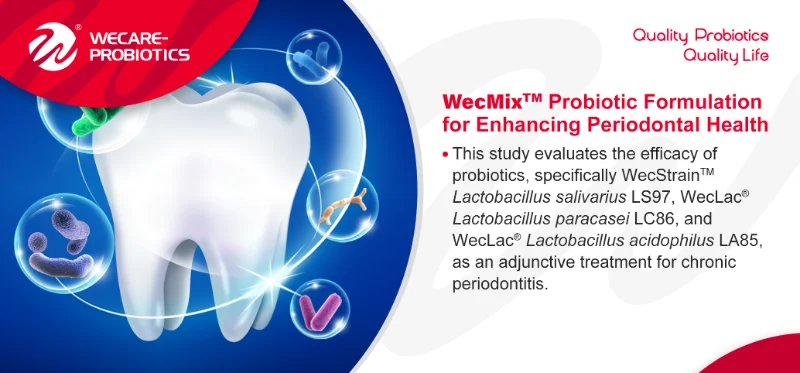Introduction
Chronic periodontitis, an inflammatory disease, involves the excessive colonization of pathogens like Porphyromonas gingivalis and Fusobacterium nucleatum, leading to tissue damage and potential tooth loss. Traditional treatment using antibiotics disrupts the oral ecosystem and promotes drug resistance. This study evaluates the efficacy of probiotics, specifically Lactobacillus salivarius LS97, Lactobacillus paracasei LC86, and Lactobacillus acidophilus LA85, as an adjunctive treatment for chronic periodontitis.
Methodology
A randomized controlled trial was conducted involving 20 patients diagnosed with chronic periodontitis. They were divided into two groups: a probiotic group (n=10) and a placebo group (n=10). The probiotic group received chewable tablets containing 5 × 10⁹ CFU of the probiotic strains, while the placebo group received tablets without probiotics. Samples of saliva and dental plaque were collected at 0, 1, and 3 months and analyzed for salivary IgA content, microbial changes, and clinical periodontal indicators such as pocket depth (PD) and bleeding on probing (BOP).
Key Findings
1. Increase in Salivary IgA: Patients in the probiotic group showed a significant increase in salivary IgA levels compared to the placebo group. This immune boost is critical for defending against oral pathogens.
2. Reduction in PD and BOP: Both groups showed a decrease in periodontal pocket depth and bleeding, but the reduction was significantly greater in the probiotic group, indicating enhanced healing.
3. Microbial Shifts: While the overall structure of the salivary and dental plaque microbiota remained stable, the probiotic group experienced a substantial reduction in pathogenic bacteria such as Fusobacterium and Porphyromonas. Simultaneously, Lactobacillus abundance increased, indicating a favorable shift in the microbial environment.
4. No Adverse Changes: Importantly, the use of probiotics did not cause significant disruptions to the overall microbiota composition, demonstrating the safety of this intervention.
Conclusion This study highlights the benefits of probiotic intervention in managing chronic periodontitis. The use of Lactobacillus strains not only boosted immune responses but also reduced harmful pathogens, improving clinical outcomes. Probiotic-assisted physical intervention offers a promising non-antibiotic alternative for periodontal therapy, enhancing recovery without adverse microbiota disruptions.



